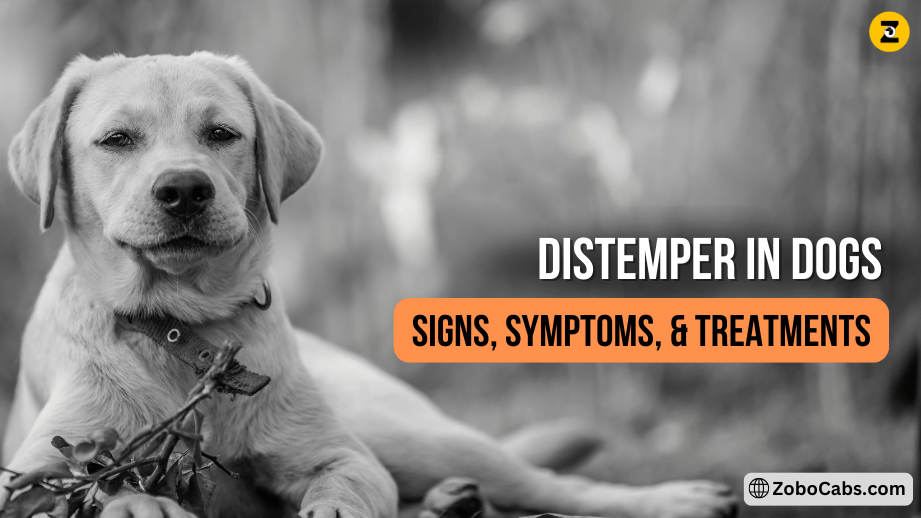In this article:
As a loving pet parent, seeing your dog unwell is heart-wrenching. One of the most concerning diseases you may encounter is canine distemper. This dangerous viral infection can severely affect dogs of all ages, causing symptoms that range from mild to life-threatening. It’s essential to understand the signs, symptoms, and available treatments so that you can provide the best care for your furry friend. If you are in Kolkata and need emergency transportation for your sick dog, Zobo Cabs offers a reliable pet ambulance in Kolkata to ensure your pet gets to a veterinary clinic as quickly as possible.
What is Canine Distemper?
Canine distemper is a highly contagious viral disease that affects various bodily systems in dogs, including the respiratory, gastrointestinal, and nervous systems. The virus is spread through air droplets when an infected dog coughs or sneezes, and it can also spread through contaminated surfaces or bodily fluids. Distemper is a serious disease, and unfortunately, it can be fatal without early intervention.
Example: A dog named Max, a playful 2-year-old labrador, started showing symptoms like coughing, a runny nose, and mild fever. His owners thought it was just a cold, but after a few days, Max’s condition worsened, and he started having difficulty walking. Max’s owners rushed him to a vet, where he was diagnosed with distemper. Timely treatment and transportation in a pet ambulance helped Max recover, but not all cases are as fortunate. Distemper can be fatal if left untreated.
Signs and Symptoms of Distemper
Distemper symptoms often appear in stages and may initially resemble a common cold, making it difficult to identify. However, as the disease progresses, the symptoms can escalate to severe conditions. Here’s how you can recognize distemper in your dog:
- Respiratory Symptoms: The first signs of distemper may include a persistent cough, nasal discharge, and sneezing. The dog may also experience watery eyes. Early on, these symptoms might seem similar to those of a common cold, but they tend to worsen rapidly.
Example: Daisy, a 4-year-old beagle, started having a runny nose and a cough. Her owner thought it was just seasonal allergies, but after a few days, the symptoms didn’t improve. As Daisy’s cough became more frequent and her nose discharge turned thick and yellow, her owners decided to consult the vet, where she was diagnosed with distemper.
- Gastrointestinal Issues: As the disease advances, dogs may start to vomit, have diarrhea, or lose their appetite. Dehydration can set in quickly, so it’s essential to monitor your pet’s food and water intake.
Example: Simba, a 3-year-old golden retriever, started vomiting and having severe diarrhea. His owner assumed it was a stomach bug but grew concerned when Simba’s energy levels decreased drastically. A visit to the vet revealed that Simba had contracted distemper.
- Neurological Symptoms: One of the most dangerous symptoms of distemper is its effect on the dog’s nervous system. This can lead to seizures, tremors, loss of coordination, and even paralysis. These signs indicate a severe stage of the disease and require immediate medical attention.
Example: Rosie, a 5-year-old German shepherd, had been fighting off the earlier signs of distemper. But after a few days, she began experiencing tremors and could no longer stand properly. Her owners rushed her to the vet’s office, where she was diagnosed with neurological damage caused by distemper.
- Fever and Lethargy: Dogs infected with distemper often show signs of fever, lethargy, and loss of energy. They may become less interested in playing or eating, which are telltale signs that something is wrong.
Example: Buddy, a 2-year-old bulldog, spent most of his day sleeping and refused his food. When his owners noticed his fever, they knew it was time to see the vet. The symptoms were consistent with distemper, and immediate treatment was needed.
How is Canine Distemper Diagnosed?
Veterinarians diagnose distemper through a combination of clinical signs and laboratory tests. While a vet will begin by assessing your dog’s symptoms, blood tests or polymerase chain reaction (PCR) tests may be necessary to confirm the diagnosis.
Example: When Lucy, a 1-year-old pug, showed respiratory symptoms followed by gastrointestinal problems, her vet suspected distemper. Blood tests were conducted, confirming the diagnosis, allowing for timely treatment.
Treatment for Distemper in Dogs
Currently, there is no cure for distemper, so treatment focuses on providing supportive care to help your dog recover. The treatment plan will depend on how early the disease was caught and how severe the symptoms are. Some of the common treatments include:
- Supportive Care: This involves ensuring that the dog stays hydrated and nourished. Fluids may be given intravenously if the dog is unable to drink water. In some cases, a special feeding tube may be used.
Example: Toby, a 3-year-old beagle, was treated with IV fluids and medications to control his vomiting and diarrhea. His condition stabilized after a few days of supportive care.
- Antibiotics: While antibiotics don’t cure distemper, they are used to treat secondary bacterial infections, which are common in distemper-infected dogs.
- Seizure Control: If your dog experiences seizures, anti-seizure medications may be prescribed to prevent or manage these episodes.
- Pain Management: Distemper can cause significant discomfort, so pain relief medications are often administered to make your pet more comfortable.
- Hospitalization: In severe cases, your dog may need to be hospitalized for close monitoring, IV fluids, and additional care. This is especially true for dogs exhibiting neurological symptoms like seizures or paralysis.
Example: After undergoing hospitalization and receiving proper treatment, Bella, a 4-year-old dachshund, gradually recovered from distemper. She needed a few weeks of recovery, but she eventually regained her strength and mobility.
Can You Prevent Distemper in Dogs?
The best way to prevent distemper is through vaccination. Puppies should receive their first distemper vaccination at around 6-8 weeks of age, with follow-up shots every few weeks until 16 weeks old. Adult dogs should receive annual or tri-annual boosters to maintain immunity.
Example: When it comes to prevention, dogs like Charlie, a 2-year-old terrier, received timely vaccinations and never developed distemper. His owners always ensured he received his boosters, keeping him safe from the virus.
When to Call for Help
If you suspect that your dog may have distemper, it’s crucial to call for help immediately. Distemper can progress quickly, especially when neurological symptoms are involved. If you’re in Kolkata and need to transport your sick dog to the vet urgently, Zobo Cabs’ pet ambulance service offers safe and quick transportation. Our pet ambulance is equipped to handle medical emergencies and get your pet the care they need as soon as possible.
Why Choose Zobo Cabs for Pet Transportation?
Zobo Cabs offers pet taxis in Kolkata that are designed with your pet’s safety and comfort in mind. Our pet ambulance service in Kolkata is equipped with medical supplies to handle emergencies, ensuring your dog gets to the vet swiftly and securely. Whether your dog is experiencing mild symptoms or a severe emergency, our reliable and compassionate service will provide the care your furry friend deserves.
Example: When Max, a 2-year-old labrador, experienced sudden seizures due to distemper, his owners called Zobo Cabs’ pet ambulance. Our team transported Max quickly to the vet, where he received immediate treatment, giving him the best chance of recovery.
Conclusion: Taking Care of Your Furry Friend
Distemper is a serious illness that requires immediate attention and care. Recognizing the symptoms early can make a significant difference in the outcome. Always ensure that your dog’s vaccinations are up to date and consult your vet if you notice any unusual signs.
If your pet shows symptoms of distemper, don’t wait. Contact Zobo Cabs for a pet ambulance in Kolkata, and let us ensure your furry friend gets the medical attention they need right away.

Author: Editor
Related Articles
Most popular articles on ZoboCabs right now!




